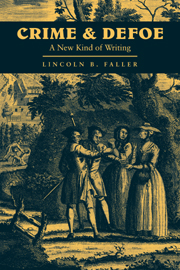Book contents
- Frontmatter
- Contents
- Preface
- List of abbreviations
- 1 Romancing the real: the “field” of criminal biography
- 2 Defoe's realism: rough frames, strange voices, surprisingly various subjects and readers made more present to themselves
- 3 The copious text: opening the door to inference, or, room for those who know how to read it
- 4 Intimations of an invisible hand: the mind exercised, enlarged, and kept in play by strange concurrences
- 5 The general scandal upon business: unanswerable doubts, and the text as a field supporting very nice distinctions
- 6 The frontiers of dishonesty, the addition and concurrence of circumstances: more on the strategic situating of names
- 7 Notions different from all the world: criminal stupidity, the self, and the symbolic order
- Closing comments: truth, complexity, common sense, and empty spaces
- Index
- Frontmatter
- Contents
- Preface
- List of abbreviations
- 1 Romancing the real: the “field” of criminal biography
- 2 Defoe's realism: rough frames, strange voices, surprisingly various subjects and readers made more present to themselves
- 3 The copious text: opening the door to inference, or, room for those who know how to read it
- 4 Intimations of an invisible hand: the mind exercised, enlarged, and kept in play by strange concurrences
- 5 The general scandal upon business: unanswerable doubts, and the text as a field supporting very nice distinctions
- 6 The frontiers of dishonesty, the addition and concurrence of circumstances: more on the strategic situating of names
- 7 Notions different from all the world: criminal stupidity, the self, and the symbolic order
- Closing comments: truth, complexity, common sense, and empty spaces
- Index
Summary
Perhaps the major problem in attempting to place Defoe in his time involves a more precise definition of Defoe's relation with his audience … we may never discover in the fragmentary records we have what enabled Defoe to find a style which his contemporaries recognized as original and exciting and which brought the end of the romance and the beginning of the novel.
Maximillian Novak, “Defoe,” in The English Novel: Select Bibliographical Guides, ed. A. E. Dyson (London, 1974), p. 30To understand the true Meaning of any ancient Writing, we ought to be acquainted with the Usages and Customs of the Time and Nation in which it was wrote, those Accidents and Circumstances which occasioned the writing of it, and (since the Sense of Words is continually changing), the Meaning in which such and such Words were used at the Time when the Author flourished.
?Defoe, A Collection of Miscellany Letters Selected out of Mist's Weekly Journal (1722–7), 2: 114Discourse in the novel is structured on an uninterrupted mutual interaction with the discourse of life.
M. M. Bakhtin, “Discourse in the Novel,” in The Dialogic Imagination, ed. Michael Holquist, tr. Caryl Emerson and Michael Holquist (Austin, Tex., 1981), p. 383Poetry … is perpetual confrontation of lexicon with the world of things.
Jan Mukařovsky, “Poetic Reference,” in Semiotics of Art, ed. Ladislav Matejka and Irwin R. Titunik (Cambridge, Mass., 1976), p. 162Defoe lived in a period notably troubled and greatly fascinated by crime.
- Type
- Chapter
- Information
- Crime and DefoeA New Kind of Writing, pp. xi - xviiiPublisher: Cambridge University PressPrint publication year: 1993



